
1852 USA: "Uncle Sam" makes his debut as a cartoon character in the New York Lantern. (AP)
1865 Civil War: Confederacy approves black soldiers:
In a desperate measure, the Confederate States of America reluctantly approve the use of black troops as the main Rebel armies face long odds against much larger Union armies at this late stage of the war.
The situation was bleak for the Confederates in the spring of 1865. The Yankees had captured large swaths of southern territory, General William T. Sherman's Union army was tearing through the Carolinas, and General Robert E. Lee was trying valiantly to hold the Confederate capital of Richmond against General Ulysses S. Grant's growing force. Lee and Confederate president Jefferson Davis had only two options. One was for Lee to unite with General Joseph Johnston's army in the Carolinas and use the combined force to take on Sherman and Grant one at a time. The other option was to arm slaves, the last source of fresh manpower in the Confederacy.
The idea of enlisting blacks had been debated for some time. Arming slaves was essentially a way of setting them free, since they could not realistically be sent back to the plantation after they had fought. General Patrick Cleburne had suggested enlisting slaves a year before, but few in the Confederate leadership considered the proposal, since slavery was the foundation of southern society. One politician asked, "What did we go to war for, if not to protect our property?" Another suggested, "If slaves will make good soldiers, our whole theory of slavery is wrong." Lee weighed in on the issue and asked the Confederate government for help. "We must decide whether slavery shall be extinguished by our enemies and the slaves be used against us, or use them ourselves." Lee asked that the slaves be freed as a condition of fighting, but the bill that passed the Confederate Congress on March 13 did not stipulate freedom for those who served.
The measure did nothing to stop the destruction of the Confederacy. Several thousand blacks were enlisted in the Rebel cause, but they could not begin to balance out the nearly 200,000 blacks that fought for the Union.
1881 Russia: Czar Alexander II assassinated:
Czar Alexander II, the ruler of Russia since 1855, is killed in the streets of St. Petersburg by a bomb thrown by a member of the revolutionary "People's Will" group. The People's Will, organized in 1879, employed terrorism and assassination in their attempt to overthrow Russia's czarist autocracy. They murdered officials and made several attempts on the czar's life before finally assassinating him on March 13, 1881.
As czar, Alexander did much to liberalize and modernize Russia, including the abolishment of serfdom in 1861. However, when his authority was challenged, he turned repressive, and he vehemently opposed movements for political reform. Ironically, on the very day he was killed, he signed a proclamation‑-the so-called Loris-Melikov constitution‑-that would have created two legislative commissions made up of indirectly elected representatives.
He was succeeded by his 36-year-old son, Alexander III, who rejected the Loris-Melikov constitution. Alexander II's assassins were arrested and hanged, and the People's Will was thoroughly suppressed. The peasant revolution advocated by the People's Will was achieved by Vladimir Lenin's Bolshevik revolutionaries in 1917. (History.com)
1884 The Siege of Khartoum lasted from March 13, 1884 to January 26, 1885. It was fought in and around Khartoum between Egyptian forces led by British General Charles George Gordon and a Mahdist Sudanese army led by the self-proclaimed Mahdi Muhammad Ahmad. Khartoum was besieged by the Mahdists and defended by a garrison of 7,000 Egyptian and loyal Sudanese troops. After a ten-month siege, the Mahdists finally broke into the city and the entire garrison was killed.
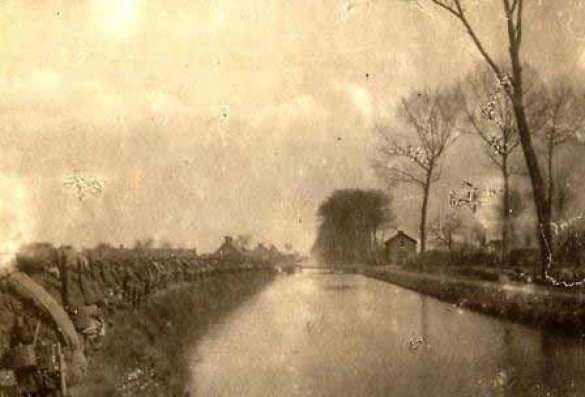
1915 World War I: Battle of Neuve Chapelle ends:
British forces end their three-day assault on the German trenches near the village of Neuve Chapelle in northern France, the first offensive launched by the British in the spring of 1915.
The Battle of Neuve Chapelle began on March 10, 1915, at 8:05 a.m., when British forces attempted to break through the German trenches at Neuve Chapelle and capture the village of Aubers, less than a mile to the east . . . . On March 13, the third and final day of the Battle of Neuve Chapelle, British troops repelled a German attack and launched another of their own. They were forced to call a halt after less than two hours, however, as many units had been decimated. By the time the attacks were called off later that day, Allied forces had captured a small salient 2,000 yards wide and 1,200 yards deep, along with 1,200 German prisoners, at the cost of 7,000 British and 4,200 Indian casualties.
The Battle of Neuve Chapelle highlighted the primitive state of communications on the battlefield during World War I, which made it incredibly difficult for commanders on both sides to know where and when to effectively deploy their reserve troops. General John Charteris, director of military intelligence under British commander Alexander Haig, took another sobering lesson from the battle, writing that "England will have to accustom herself to far greater losses than those of Neuve Chapelle before we finally crush the German army." (History.com)
1915 Far East: The United States, while protesting Japanese encroachments on Chinese sovereignty, nevertheless affirms Japan's "special interests" in Manchuria, Mongolia and Shandong. (Tse-tung) [See: Countdown to Infamy: Timeline to Pearl Harbor.]
1920 Weimar: Kapp Putsch: Berlin is seized in a right-wing Putsch. American-born journalist Wolfgang Kapp, 51 year-old founder of the Fatherland Party, receives support from irregular troops under General von Luttwitz, in a move to restore the monarchy. The disbanded troops, back from fighting "Bolshevik republicanism" in the Baltic provinces, are led by the Erhardt Brigade wearing swastikas on their helmets. The legitimate government escapes to the provinces, Kapp is made Chancellor and orders a general strike, he gets support from General Ludendorff but fails to gain foreign recognition. The army remains generally uncommitted, the Security Police oppose him and Kapp soon finds he has no authority. (See March 17). (THP)
At the suggestion of Epp, Mayr, and Roehm, Hitler and Dietrich Eckart travel to Berlin with a view to possible collaboration with the Kapp Putsch organizers.
Gustav von Kahr assumes dictatorial powers in Munich.
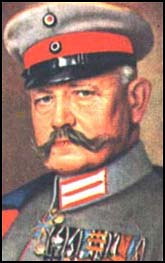
1932 Weimar: Presidential Election: In the first ballot, Von Hindenburg polls 18.6 million, i.e., 49.6 per cent of the votes; Hitler, 11.3 million, i.e., 30.0 per cent of the votes. Hindenburg fails to win a majority, necessitating a run-off election. (See April 10)
1933 Various:
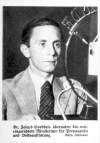
Nazi Germany: Hitler appoints Joseph Goebbels Reich Minister of Public Enlightenment and Propaganda. He quickly begins 'coordinating' all aspects of cultural life, the press and communications under the control of the Nazi Party. Day after day, Goebbels drills home the messages of blood, race, and glory, all cleverly designed to appeal to the broadest segment of the German masses. Antisemitism was one of his highest priorities and most useful tools. [See: When Did Hitler Become an Anti-Semite?]
Church and Reich:
Holocaust: Breslau The SA organizes picket lines at court entrances in order to prevent Jewish judges and lawyers access. (THP)
USA: Banks begin to re-open after a holiday declared by President Franklin D. Roosevelt. (AP)
1935 Holocaust: Retraining: German Jews are prohibited from reorienting their lives as artisans with the intent of remaining in the country. (THP)
1938 Various:
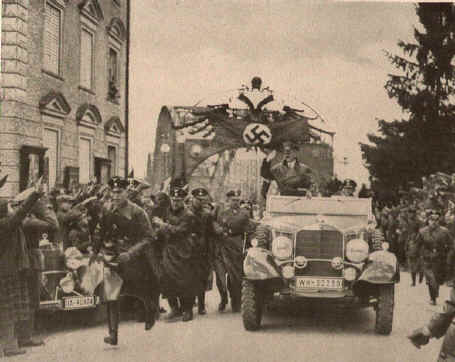
1938 Anschluss: Among those who greet Hitler in Austria is Robert Kauer, president of Austria's minority Lutheran Church. He welcomes Hitler as the "saviour of the 350,000 German Protestants in Austria and liberator from a five-year hardship".
From The Life And Death of Adolf Hitler by Robert Payne:
The next day [March 13, 1938] he [Hitler] drove in his armored Mercedes to Leonding to see the garden house where he had grown up and to lay a wreath on the grave of his parents. August Kubizek, now the town clerk at Efferding, nearly bald but still recognizably the same person Hitler had known in Vienna, came to visit him at the Weinzinger Hotel, and they spent an hour together recalling old times. Standing at the window, Hitler pointed to the city, which had scarcely changed in a quarter of a century. "It will change now," he said. He spoke of throwing a new bridge across the Danube, to be known as Nibelung's Bridge, and there would be a new opera house, a new theater, and a new concert hall. He promised that Linz would become one of the great cities in Greater Germany, rivaling Vienna in its magnificence and beauty; and whjile Kubizek listened open-mouthed, Hitler sketched out his plans for rebuilding the city. Later there were parades of the local National Socialists, who wore swastika armbands but had no uniforms. They paraded in leather shorts, knickerbockers, and ski pants. From an upper window on the Landstrasse, old Dr. Eduard Bloch, who had attended Hitler in his youthful sickness and looked after Klara Hitler when she lay dying, watched and trembled, wondering if he would suffer the fate of all other Jew in Linz.
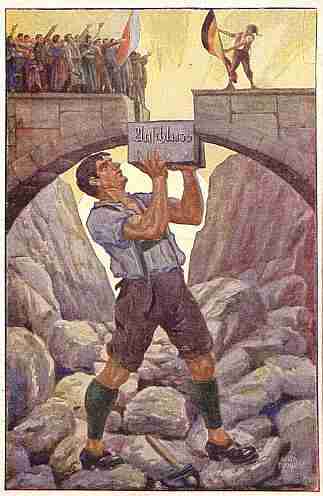
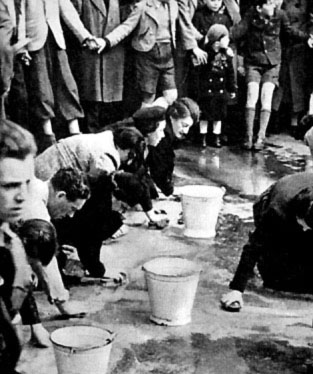
Holocaust: Austria: More than 138,000 Austrian Jews now come under Nazi rule. The activities of all Jewish organizations and congregations are quickly forbidden, and the Gestapo launches a campaign of terror, looting hundreds of Jewish shops and apartments. Many Jewish leaders are arrested, and more than 500 Jews, driven to despair, soon commit suicide. (THP)
Anschluss: The day after the invasion, Goering, who had been left in Berlin in charge of the Reich by Hitler, phones Ribbentrop in London:
Goering: As you know, the Fuehrer has entrusted me with the administration of the current government procedures (Fuehrung der Regierungsgeschaefte), and therefore I wanted to inform you. There is overwhelming joy in Austria, that you can hear over the radio.
Ribbentrop: Yes, it is fantastic, is it not?
Goering: Yes, the last march into the Rhineland is completely overshadowed. The Fuehrer was deeply moved, when he talked to me last night. You must remember it was the first time that he saw his homeland again. Now, I mainly want to talk about political things. Well, this story that we had given an ultimatum is just foolish gossip. From the very beginning the National Socialist Ministers and the representatives of the people (Volksreferenten) have presented the ultimatum. Later on more and more prominent people of the movement participated, and as a natural result, the Austrian National Socialist Ministers asked us to back them up so that they would not be completely beaten up again and be subjected to terror and civil war.
Then we told them we would not allow Schuschnigg to provoke a civil war, under any circumstances. Whether by Schuschnigg's direct order or with his consent, the communists and the Reds had been armed and were already making demonstrations, which were photographed with "Heil Moskau" and so on. Naturally, all these facts caused some danger for Wiener-Neustadt. Then you have to consider that Schuschnigg made his speeches, telling them the Vaterlaendische Front would fight to the last man. One could not know that they would capitulate like that, and therefore Seyss-Inquart, who already had taken over the Government, asked us to march in immediately. We had already marched up to the frontier before this, since we could not know whether or not there would be a civil war. These are the actual facts which can be proved by documents . . . .
I want you once more [to] tell the following to Halifax and Chamberlain: It is not correct that Germany has given an ultimatum. This is a lie by Schuschnigg, because the ultimatum was presented to him by Seyss-Inquart, Glaise-Horstenau, and Jury. Furthermore, it is not true that we have presented an ultimatum to the Federal President, but that it also was given by the others, and as far as I know, just a military attache came along, asked by Seyss-Inquart, because of a technical question. He was supposed to ask whether, in case Seyss-Inquart would ask for the support of German troops, Germany would grant this request. Furthermore, I want to state that Seyss-Inquart asked us expressly, by phone and by telegram, to send troops because he did not know about the situation in Wiener-Neustadt, Vienna, and so on; because arms had been distributed there. And then he could not know how the Fatherland Front might react since they always had had such a big mouth.
Ribbentrop: Herr Goering, tell me, how is the situation in Vienna; is everything settled yet?
Goering: Yes. Yesterday I landed hundreds of airplanes with some companies, in order to secure the airfields, and they were received with joy. Today the advance unit of the 17th division marches in, together with the Austrian troops. Also, I want to point out that the Austrian troops did not withdraw, but that they got together and fraternized immediately with the German troops, wherever they were stationed . . . .
Goering: Well, do come! I shall be delighted to see you.
Ribbentrop: I shall see you this afternoon.
Goering: The weather is wonderful here-blue sky. I am sitting here on my balcony—all covered with blankets—in the fresh air, drinking my coffee. Later on I have to drive in. I have to make the speech. And the birds are twittering, and here and there I can hear over the radio the enthusiasm, which must be wonderful over there [Vienna].
Ribbentrop: That is marvelous. (IMT) [See: Austria: The Other Germany.]
Death: Nikolai Bukharin executed by a Soviet firing squad:
The trial of Bukharin and his fellow oppositionists has broken about the ears of the world like the detonation of a bomb. One can hear the cracking of liberal hopes; of the dream of anti-fascist unity; of a whole system of revolutionary philosophy wherever democracy is threatened, the significance of the trial will be anxiously weighed. In spite of the trials, I believe Russia is dependable; that it wants peace, and will join in any joint effort to check Hitler and Mussolini, and will also fight if necessary. Russia is still the strongest reason for hope.
1939 Death: Otto Rahn: German medievalist and a Obersturmbannfuehrer of the SS:

Otto Rahn became a legend himself; having joined the SS, he had to resign, followed by various wild stories about his death in the Pyrenees, none of which have been proven. Christian Bernadac in Le Mystere Otto Rahn (1994) even claims that Otto Rahn simply changed his name and became "Rudolf Rahn" the last Nazi ambassador in Rome. One issue Christian Bernadac's book has in common however with the more reliable article by Joseph Mandement in La Depeche: both agree Otto Rahn was part of a propaganda fraud (he was seen planting German rune-graffiti on the walls of some of the mountain hideouts he visited), in preparation of the invasion of France by the Nazis.
1941 Holocaust: Netherlands: From a speech in Amsterdam by Arthur Seyss-Inquart:
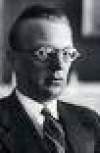
The Jews, for us, are not Dutch. They are those enemies with whom we can come to neither an armistice nor to peace. This applies here, if you wish, for the duration of the occupation. Do not expect an order from me which stipulates this, except regulations concerning police matters. We will beat the Jews wherever we meet them, and those who join them must bear the consequences. The Fuehrer declared that the Jews have played their final act in Europe, and therefore they have played their final act. [See: Can We, and Should, We Try to Explain the Holocaust?]
1942 World War II: Various:
Julia Flikke becomes the first woman colonel in US Army:
As the nation galvanized to meet the coming demands of World War II, Flikke spearheaded the Army Nurse Corps' increasingly difficult efforts to recruit, outfit, and assign the greatest number of nurses ever mobilized. One of the more visible and enduring signs of her efforts to attract nurses to military service during the war was the publication of her volume entitled Nurses in Action, The Story of the Army Nurse Corps. In December 1942, Public Law 828 authorized AUS (Army of the United States) commissions in grades from second lieutenant to colonel for Army nurses. Flikke then became the first female colonel in the AUS. At that time, the title of her position changed from superintendent to chief of the Army Nurse Corps. Simultaneously, Army nurses were given pay equal to officers of comparable grade.
U.S. Army launches K-9 Corps: the Quartermaster Corps (QMC) of the United States Army begins training dogs for the newly established War Dog Program, or "K-9 Corps."
Well over a million dogs served on both sides during World War I, carrying messages along the complex network of trenches and providing some measure of psychological comfort to the soldiers. The most famous dog to emerge from the war was Rin Tin Tin, an abandoned puppy of German war dogs found in France in 1918 and taken to the United States, where he made his film debut in the 1922 silent film The Man from Hell's River. As the first bona fide animal movie star, Rin Tin Tin made the little-known German Shepherd breed famous across the country.
In the United States, the practice of training dogs for military purposes was largely abandoned after World War I. When the country entered World War II in December 1941, the American Kennel Association and a group called Dogs for Defense began a movement to mobilize dog owners to donate healthy and capable animals to the Quartermaster Corps of the U.S. Army. Training began in March 1942, and that fall the QMC was given the task of training dogs for the U.S. Navy, Marines and Coast Guard as well.
The K-9 Corps initially accepted over 30 breeds of dogs, but the list was soon narrowed to seven: German Shepherds, Belgian sheep dogs, Doberman Pinschers, collies, Siberian Huskies, Malamutes and Eskimo dogs. Members of the K-9 Corps were trained for a total of 8 to 12 weeks. After basic obedience training, they were sent through one of four specialized programs to prepare them for work as sentry dogs, scout or patrol dogs, messenger dogs or mine-detection dogs. In active combat duty, scout dogs proved especially essential by alerting patrols to the approach of the enemy and preventing surprise attacks.
The top canine hero of World War II was Chips, a German Shepherd who served with the Army's 3rd Infantry Division. Trained as a sentry dog, Chips broke away from his handlers and attacked an enemy machine gun nest in Italy, forcing the entire crew to surrender. The wounded Chips was awarded the Distinguished Service Cross, Silver Star and the Purple Heart—all of which were later revoked due to an Army policy preventing official commendation of animals. (History.com)
1943 World War II: Various:
War in the Pacific: In Bougainville, Japanese troops end their assault on American forces at Hill 700. "The Bougainville campaign was a campaign of World War II that occurred from November 1 1943 to August 21 1945, on and around Bougainville Island in the South Pacific between the Empire of Japan and Allied forces.
Holocaust: Krakow Ghetto is liquidated by German forces. [See: Is It Revisionism or Denial, and Why Does it Matter?]
Holocaust: Nazi German troops begin liquidating the Jewish Ghetto in Krakow, Poland, sending about 8,000 Jews deemed able to work to the Plaszow labor camp, with the rest either killed or sent to Auschwitz. [For further information, click here.]
1944 World War II: Various:
Italy: the USSR recognizes the Badoglio government.
London suspends travel between Ireland and Britain: the result of the Irish government's refusal to expel Axis-power diplomats within its borders.
In 1922, an independent Irish republic was established after generations of conflict between Ireland and Britain. One of the conditions of that agreement was that Britain would retain control of three naval bases along the Irish coast in order to continue Ireland's defense. But as war loomed in the late 1930s, Irish Prime Minister Eamon de Valera negotiated an agreement that ended the British occupation of those naval bases; Ireland had declared a pre-emptive state of neutrality in any European war, and the presence of the Royal Navy on independent Irish soil violated that neutrality. De Valera did not want Ireland to become an object of attacks aimed at Britain.
De Valera was willing to bargain away Irish neutrality, though, in exchange for Northern Ireland's being returned to the Irish Republic. The British were not willing to pay that price but did agree to end conscription in Northern Ireland once De Valera denounced conscription—because it forced Irish men to fight in what De Valera believed was an English war—as an "act of aggression."
Irish neutrality was challenged in 1941, with German air raids against Dublin. It was challenged again in 1942, when the United States landed troops in Northern Ireland, under the understanding that it was under the control of its ally, Britain. De Valera protested. President Franklin D. Roosevelt was stunned at this intransigence and applied pressure to the de Valera government, attempting to change Ireland's neutrality stance. De Valera did not relent. Finally, when the Irish prime minister refused to expel from Ireland the diplomats of the Axis powers, Britain retaliated by suspending all travel between the Irish Republic and the United Kingdom. Ireland did not flinch and, when the war ended, developed good relations with all the powers involved. (History.com)
1945 World War II: Various:

Josef Goebbels rages to his diary:
This evening's Mosquito raid was particularly disastrous for me because our Ministry was hit. The whole lovely building on the Wilhelmstrasse was totally destroyed by a bomb . . . . The Fuehrer telephones me immediately after the raid on the Ministry. He too is very sad that it has now hit me. So far we have been lucky even during the heaviest raids on Berlin. Now, however, we have lost not only a possession but an anxiety. In future I need no longer tremble for the Ministry. All those present at the fire voiced only scorn and hatred for Goering. All were asking repeatedly why the Fuehrer does not at last do something definite about him and the Luftwaffe. The Fuehrer than asks me over for a short visit. During the interview I have with him he is very impressed by my account of things. I give him a description of the devastation which is being wrought and tell him particularly of the increasing fury of the Mosquito raids which take place every evening. I cannot prevent myself voicing sharp criticism of Goering and the Luftwaffe.
But it is always the same story when one talks to the Fuehrer on this subject. He explains the reasons for the decay of the Luftwaffe, but he cannot make up his mind to draw the consequences therefrom. He tells me that after the recent interviews he had with him Goering was a broken man. But what is the good of that! I can have no sympathy with him. If he did lose his nerve somewhat after his recent clash with the Fuehrer, that is but a small punishment for the frightful misery he has brought and is still bringing on the German people. I beg the Fuehrer yet again to take action at last, since things cannot go on like this. We ought not, after all, to send our people to their doom because we do not possess the strength of decision to root out the cause of our misfortune. The Fuehrer tells me that new fighters and bombers are now under construction, of which he has certain hopes. But we have heard it so often before that we can no longer bring ourselves to place much hope in such statements. In any case it is now plenty late—not to say too late—to anticipate any decisive effect from such measures. [See: The Last Days of the Third Reich.]
1945 Wunderwaffen: Adolf Hitler, in cynical conversation with officers of the German Ninth Army: "We have invisible aircraft, submarines, colossal tanks and cannon, unbelievably powerful rockets, and a bomb with a working that will astonish the whole world. The enemy knows this, and besieges and attempts to destroy us. But we will answer this destruction with a storm and that without unleashing a bacteriological war, for which we are also prepared . . . . All my words are the purest truth. That you will see!...We still have things that need to be finished, and when they are finished, they will turn the tide." From 'Das Geheimnis' by Edgar Mayer and Thomas Mehner. Note: There is some contention over the accuracy of this item; it is probably not reliable. [See: Why Did Hitler Insist on No Surrender?]
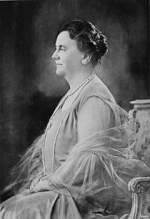
Netherlands: Return of Queen Wilhelmina from the UK to her kingdom.
Churchill to FDR:
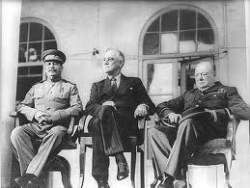
At Yalta also we agreed to take the Russian view of the frontier line. Poland lost her frontier. Is she now to lose her freedom? That is the question which will undoubtedly have to be fought out in Parliament and in public here. I do not wish to reveal a divergence between the British and United States Governments, but it would certainly be necessary for me to make it clear that we are in the presence of a great failure and an utter breakdown of what we settled at Yalta, but that we British have not the necessary strength to carry the matter further and that the limits of our capacity to act have been reached. The moment that Molotov sees that he has beaten us away from the whole process of consultations among Poles to form a new Government, he will know that we will put up with anything. On the other hand, I believe that combined dogged pressure and persistence along the lines on which we have been working and of my proposed draft message to Stalin would very likely succeed.
1946 Nuremberg Tribunal: On day 80, Kesselring wraps up his testimony:
Dr Laternser: Witness, do you also know of any violations of international law by the other side? Kesselring: During my many visits to the front I did, of course, come across a large number . . .
General Rudenko: I protest against this question. In my opinion, the witness is not the person to make any statement as to whether Germany's enemies have violated international law. I think this question should be omitted.
Dr Laternser: May I explain my point? I am interested in an answer to this question because I want to follow it with the further question to the witness, whether after he heard of violations of international law by the other side, he became more lenient concerning violations of international law by his own men. That is why I am anxious to have this question answered.
The President: The Tribunal would like to know exactly what your question is and why you say it is competent.
Dr Laternser: The exact wording of the question is as follows: I asked the witness, "Do you also know of any violations of international law by the other side?" According to his answer I intend to put the further questions to the witness, whether, in view of such violations of international law by the other side, he either did not punish at all or dealt more leniently with violations of international law by his own men. From the answer to this latter question I want to ascertain the attitude of the witness as a member of the group, and that is why I consider the answer to the first question to be important.
The President: The Tribunal would like to hear what Counsel for the United States says about it. Justice Jackson: If Your Honor please, I believe it is a well-established principle of international law that a violation on one side does not excuse or warrant violations on the other side. [For the full text of today's proceedings, Click here.]
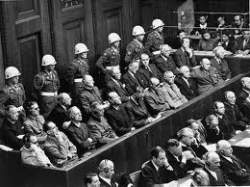
Bob Cooper, correspondent for The Times:
We stirred with expectation when Goering left his corner seat in the dock and walked boldly to the witness box, his baggy trousers falling over high jackboots, a thick sheaf of papers under his arm. Not the Goering of pomp and power, but still a considerable figure. [See: Why Didn't Adolf Hitler Fire Hermann Goering?]
Hermann Goering testifies:
I went to this protest demonstration as a spectator, without having any connection with it. Various speakers from parties and organizations spoke there. At the end Hitler, too, was called for. I had heard his name once before briefly and wanted to hear what he had to say. He declined to speak and it was pure coincidence that I stood nearby and heard the reasons for his refusal. He did not want to disturb the unanimity of the demonstration; he could not see himself speaking, as he put it, to these tame, bourgeois pirates. He considered it senseless to launch protests with no weight behind them. This made a deep impression on me; I was of the same opinion. I inquired and found that on the following Monday evening I could hear Hitler speak, as he held a meeting every Monday evening. I went there, and there Hitler spoke in connection with that demonstration, about Versailles, the treaty of Versailles, and the repudiation of Versailles. He said that such empty protests as that of Sunday had no sense at all‑-one would just pass on from it to the agenda‑-that a protest is successful only if backed by power to give it weight. Until Germany had become strong, this kind of thing was of no purpose. This conviction was spoken word for word as if from my own soul.
Death: Werner Eduard Fritz von Blomberg: a leading member of the German Army prior to World War II:
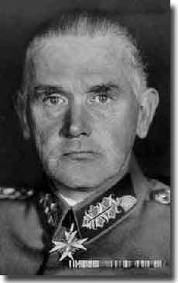
In 1936, he became Hitler's first field marshal. Unfortunately for von Blomberg, his position as the most influential man in the army alienated Hermann Goering and Heinrich Himmler, who conspired to oust von Blomberg from power. They struck in 1938, when von Blomberg, then 60, married Erna Gruhn (sometimes referred to as "Eva" or "Margarete"), a 26 year old typist. A police officer discovered that Gruhn had been a prostitute with a criminal record and reported this to the Gestapo and Goering (who, ironically, had served as a best man to von Blomberg at the wedding). Goering then informed Hitler (who also had been a best man at the wedding) of the matter, and Hitler ordered von Blomberg to annul the marriage in order to avoid a scandal and to preserve the integrity of the army. Von Blomberg refused to annul the marriage, and consequently resigned all of his posts in January 1938 when Goering threatened to make his wife's past public knowledge. Von Blomberg and his wife were subsequently exiled for a year to the isle of Capri. Spending World War II in obscurity, von Blomberg was captured by the Allies in 1945, after which time he gave evidence at the Nuremberg Trials. Von Blomberg died while in detention at Nuremberg in 1946.
1954 Vietnam War: Viet Minh attack French garrison:
A force of 40,000 Viet Minh with heavy artillery surround 15,000 French troops at Dien Bien Phu. French General Henri Navarre had positioned these forces 200 miles behind enemy lines in a remote area adjacent to the Laotian border. He hoped to draw the communists into a set-piece battle in which he hoped superior French firepower would destroy the enemy. He underestimated the enemy.
Viet Minh General Vo Nguyen Giap entrenched artillery in the surrounding mountains and massed five divisions around the French positions. The battle began with a massive Viet Minh artillery barrage, followed by an infantry assault. Fierce fighting continued to rage until May 7, 1954, when the Viet Minh overran the last French positions. The shock of the fall of Dien Bien Phu led France, already plagued by public opposition to the war, to agree to the independence of Vietnam at the Geneva Conference in 1954. (History.com)
1986 Cold War: Claiming the right of innocent passage, American warships USS Yorktown and USS Caron enter Soviet territorial waters in the Black Sea, inciting Soviet combat readiness. [For further information, click here.]
Edited by Levi Bookin (Copy editor)
levi.bookin@gmail.com



Click to join 3rdReichStudies


FAIR USE NOTICE: This site may contain copyrighted material the use of which has not always been specifically authorized by the copyright owner. We are making such material available in our efforts to advance understanding of historical, political, human rights, economic, democracy, scientific, environmental, and social justice issues, etc. We believe this constitutes a 'fair use' of any such copyrighted material as provided for in section 107 of the US Copyright Law. In accordance with Title 17 U.S.C. Section 107, the material on this site is distributed without profit to those who have expressed a prior interest in receiving the included information for research and educational purposes. If you wish to use copyrighted material from this site for purposes of your own that go beyond 'fair use', you must obtain permission from the copyright owner.
Please note that the list-owner and the moderator are not responsible for, and do not necessarily approve of, the random ads placed on our pages by our web server. They are, unfortunately, the price one pays for a 'free' website.